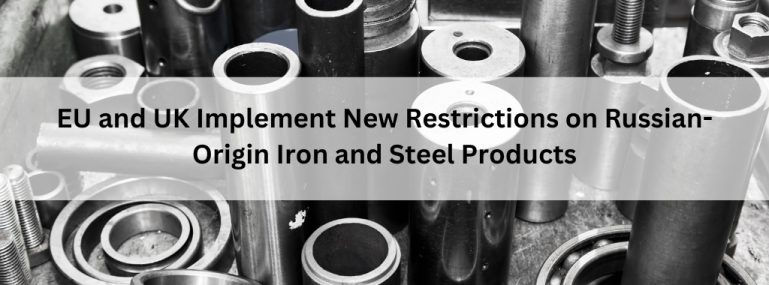In response to escalating geopolitical tensions, both the European Union (EU) and the United Kingdom (UK) have implemented stringent measures affecting the importation of Russian-origin iron and steel products. These regulations, which came into force on September 30, 2023, mark a significant shift in international trade relations and have sparked intense scrutiny under existing legal frameworks governing trade activities. The restrictions specifically target specified iron and steel products processed in third countries that incorporate Russian-origin iron and steel inputs. Importers must now declare the compliance of imported goods and be prepared to furnish evidence demonstrating compliance if requested by customs authorities.
The primary objective behind these measures is to exert economic pressure on Russia while safeguarding the integrity of domestic markets in the EU and UK. In addition to restricting imports, UK regulations also prohibit the provision of technical assistance, financial services, and funds, as well as brokering services related to the prohibited goods. Similarly, the EU has adopted a comparable prohibition through Regulation 833. Both the European Commission and the UK Government have emphasized that Mill Test Certificates serve as the preferred source of evidence regarding the origin of inputs.
The implementation of these restrictions necessitates a thorough assessment of supply chains to identify any reliance on Russian-origin iron and steel products. Traders must ensure compliance with all regulatory requirements, including documentation, licensing, and reporting obligations. Exploring alternative sources for iron and steel products, such as domestic suppliers or those from approved countries, is imperative. Robust risk management strategies should be put in place to mitigate potential disruptions and financial losses. Maintaining open communication with suppliers, customers, and regulatory authorities is crucial to staying informed of developments and addressing any concerns proactively.
At Compliance XL, we offer sustainability consulting services to companies, assisting them in staying compliant with new regulations. By sharing our knowledge and experience, we ensure that our clients remain up to date as part of their compliance data management strategy.
FAQs:
1.What is the aim of the New EU/UK Restrictions on Russian-origin Iron and Steel Products?
These measures aim to ensure transparency in the supply chain and prevent the utilization of Russian-origin materials in downstream steel products imported into the EU and UK markets.
2.What is Regulation 833?
Regulation 833 prohibits the direct and indirect purchase, import, or transfer of products into the EU if the covered products originate in or are exported from Russia.





